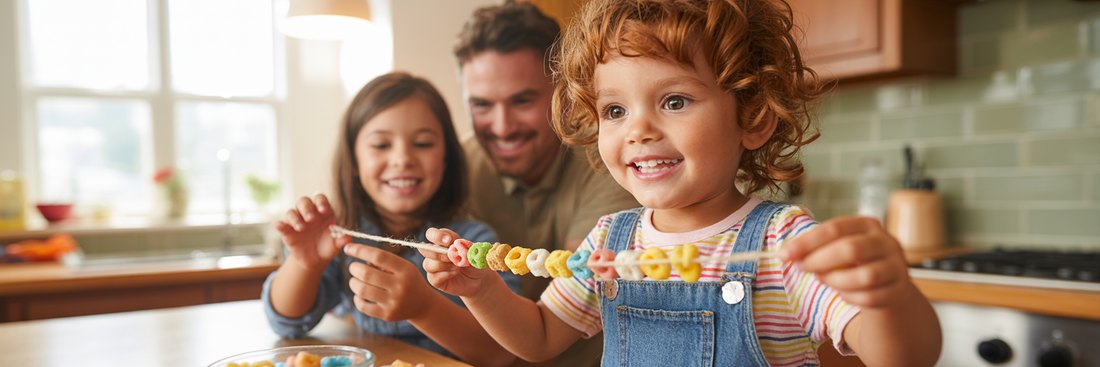
10 Must-Have Skills Every Pre-schooler Needs – And How to Build Them Through Play
As parents and carers, our role goes far beyond keeping our little ones safe — helping them grow into confident, capable humans ready to navigate the world. And that journey begins earlier than we might think… often through the simplest, most joyful moments of play.
Whether it’s a giggle-filled game of tag, colouring side by side, or diving into imaginative stories with a favourite toy, these everyday activities are doing more than keeping kids entertained. They’re helping children build the emotional, social, and physical tools they’ll carry for life — and strengthening our bond with them along the way.
Preschool isn’t just about ABCs and 123s. It’s about nurturing the whole child — their curiosity, creativity, independence, and connection with others. And the best part? You can support all of this through playful, screen-free moments at home.
In this post, we’ll explore the 10 foundational skills every preschooler needs — and share simple, practical ways to help your little one thrive through everyday fun.
Let’s dive in! 🌟
1. Language & Communication
Support your child’s growing vocabulary and expressive skills with playful interaction:
- Read a picture book and ask, “What do you think happens next?”
- Play “I Spy” using colours, shapes, or letters.
- Make silly rhyming songs about everyday things.
- Use a storytelling dice or picture cards to create your tale.
- Chat during chores: “Can you tell me how we make a sandwich?”
2. Fine Motor Skills
Help develop finger strength and coordination with hands-on activities:
- Roll, pinch, and shape playdough into animals or letters.
- Thread large beads onto a string or make cereal necklaces.
- Create sticker scenes or sticker reward charts.
- Snip paper into shapes using child-safe scissors.
- Draw zigzags and shapes in sand, salt trays, or with crayons.
3. Gross Motor Skills
Significant body movement supports brain development and builds stamina:
- Set up an indoor obstacle course with pillows and blanket tunnels.
- Play “Simon Says” with actions like jumping, stretching, and tiptoeing.
- Balance along a line of tape on the floor.
- Have a dance party with scarves or ribbons.
- Kick or roll a ball back and forth in a game of gentle soccer.
4. Emotional Regulation
Recognising and managing emotions is essential for happy learning:
- Use a feelings chart or wheel each morning.
- Create a calm-down corner with a soft toy and a book.
- Read books about emotions and discuss the characters.
- Make a “calm jar” with glitter, water, and liquid soap.
- Practice deep breathing with hands-on tummies: “Smell the flower, blow the candle.”
5. Social Skills
Learning to share, wait, and play together builds healthy friendships:
- Act out everyday scenes with dolls or stuffed animals.
- Play turn-taking games like memory or dominoes.
- Bake cookies together, assigning simple roles.
- Build a fort or Lego creation as a team.
- Role-play sharing toys or solving disagreements kindly.
6. Early Literacy
Get ready to read by weaving letters and words into play:
- Sing alphabet songs with hand motions.
- Go on a “letter hunt” at home or in a book.
- Make name puzzles from craft sticks or cut-up paper.
- Label everyday objects at home with sticky notes.
- Create a simple storybook together using drawings.
7. Early Numeracy
Playful counting and comparing sets the stage for maths success:
- Count snacks before eating: “You have five grapes!”
- Sort toys by size or colour.
- Build towers and count the blocks.
- Draw shapes with sidewalk chalk and hop between them.
- Play shop with coins, price tags, and toy food.
8. Listening & Attention
Build focus and follow directions through games and routines:
- Play “Freeze Dance” — stop when the music stops!
- Give two-step directions: “Touch your toes, then clap.”
- Do kid-friendly recipes like “no-bake energy balls.”
- Tell silly stories and ask them to guess the ending.
- Try a scavenger hunt with clues or a picture checklist.
9. Creativity & Imagination
Imaginative play fosters flexible thinking and joy in problem-solving:
- Create a puppet theatre and put on a show.
- Make art from nature: leaves, pebbles, flowers.
- Turn a cardboard box into a rocket or a house.
- Use kitchen tools for “pretend cooking.”
- Host a teddy bear tea party with play food.
10. Independence & Self-Care
Confidence blooms when children learn to help themselves:
- Set up a picture routine chart for the morning.
- Let them choose between two outfits or snacks.
- Practice packing their backpack or lunch.
- Give a small watering can to care for plants.
- Use a mirror to brush your hair or teeth together.
Conclusion
Preschoolers grow by doing; every giggle, scribble, and silly game builds essential life skills. Keep things playful, consistent, and connected; you’ll be amazed at how much your child learns through joy.
